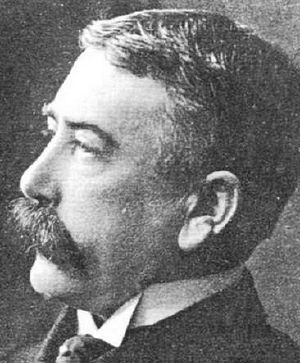Ferdinand de Saussure
Ferdinand de Saussure (pronounced [fɛr.di.nã.dɘ.so.ˈsyr]) (November 26, 1857 - February 22, 1913) was a Geneva-born Swiss linguist whose ideas laid the foundation for many of the significant developments in linguistics in the 20th century. He is widely considered the 'father' of 20th-century linguistics.
Biography
Born in Geneva in 1857, Saussure early showed signs of considerable talent and intellectual ability. After a year of studying Latin, Greek, Sanskrit, and a variety of courses at the University of Geneva, he commenced graduate work at the University of Leipzig in 1876. Two years later at 21 years Saussure studied for a year at Berlin where he wrote his only full-length work titled Mémoire sur le système primitif des voyelles dans les langues indo-européenes. He returned to Leipzig and was awarded his doctorate in 1880. Soon afterwards he relocated to Paris, where he would lecture on ancient and modern languages, and live for 11 years before returning to Geneva in 1891. Living in Geneva for the remainder of his life, Saussure continued to lecture at the University. It was not until 1906 that Saussure began teaching the Course of General Linguistics that would consume the greater part of his attention until his death in 1913.
Contributions to linguistics
The Course of General Linguistics (Cours de linguistique générale)
Saussure's most influential work, the Cours de linguistique générale (Course of General Linguistics), was published posthumously in 1916 by former students Charles Bally and Albert Sechehaye on the basis of notes taken from Saussure's lectures at the University of Geneva. The Cours became one of the seminal linguistics works of the 20th century, not primarily for the content (many of the ideas had been anticipated in the works of other 19th century linguists), but rather for the innovative approach that Saussure applied in discussing linguistic phenomena. Its central notion is that language may be analyzed as a formal system of differential elements, apart from the messy dialectics of realtime production and comprehension.
Laryngeal theory
While a student Saussure published an important work in Indo-European philology that proposed the existence of a class of sounds in Proto-Indo-European called laryngeals, outlining what is now known as the laryngeal theory. It has been argued that the problem he encountered, of trying to explain how he was able to make systematic and predictive hypotheses from known linguistic data to unknown linguistic data, stimulated his development of structuralism.
Legacy
The impact of Saussure's ideas on the development of linguistic theory in the former half of the 20th century cannot be understated. Two currents of thought emerged independently of each other, one in Europe, the other in America. The results of each incorporated the basic notions of Saussurian thought in forming the central tenets of structural linguistics. In Europe, the most important work was being done by the Prague School. Most notably, Nikolay Trubetzkoy and Roman Jakobson headed the efforts of the Prague School in setting the course of phonological theory in the decades following 1940. Jakobson's universalizing structural-functional theory of phonology, based on a markedness hierarchy of distinctive features, was the first successful solution of a plane of linguistic analysis according to the Saussurean hypotheses. Elsewhere, Louis Hjelmslev and the Copenhagen School proposed new interpretations of linguistics from structuralist theoretical frameworks. In America, Saussure's ideas informed the distributionalism of Leonard Bloomfield and the post-Bloofieldian Structuralism of those scholars guided by and furthering the practices established in Bloomfield's investigations and analyses of language. In contemporary developments, structuralism has been most explicitly developed by Michael Silverstein, who has combined it with the theories of markedness and distinctive features.
Outside linguistics, the principles and methods employed by structuralism were soon adopted by scholars and literary critics, such as Roland Barthes, Jacques Lacan, and Claude Lévi-Strauss, and implemented in their respective areas of study. However, their expansive interpretations of Saussure's theories, and their application of those theories to non-linguistic fields of study, led to theoretical difficulties and proclamations of the end of structuralism in those disciplines.
Quotes
"A sign is the basic unit of language (a given language at a given time). Every language is a complete system of signs. Parole (the speech of an individual) is an external manifestation of language."
"A linguistic system is a series of differences of sound combined with a series of differences of ideas."
See also
- Structuralism
- Leonard Bloomfield
- Roman Jakobson
- Michael Silverstein
External links
- Hearing Heidegger and Saussure by Elmer G. Wiens.
Credits
New World Encyclopedia writers and editors rewrote and completed the Wikipedia article in accordance with New World Encyclopedia standards. This article abides by terms of the Creative Commons CC-by-sa 3.0 License (CC-by-sa), which may be used and disseminated with proper attribution. Credit is due under the terms of this license that can reference both the New World Encyclopedia contributors and the selfless volunteer contributors of the Wikimedia Foundation. To cite this article click here for a list of acceptable citing formats.The history of earlier contributions by wikipedians is accessible to researchers here:
The history of this article since it was imported to New World Encyclopedia:
Note: Some restrictions may apply to use of individual images which are separately licensed.
